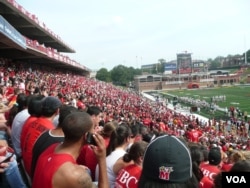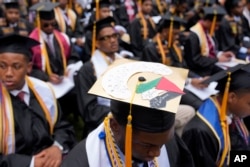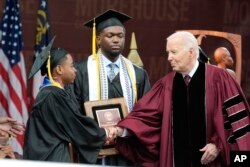Student Union
- By Tom Collier
Now What? Struggling Over the Value of Study Abroad
Our multicultural group of Brits, Americans, Belgians, French, Germans, Italians, Argentines, Australians and Chinese will probably never be back in the same room as one group again.
The joy of my life in the USA has been defined by its unpredictability – deciding on a Friday night to go to Philadelphia for the weekend, going to see NASCAR and the Kentucky Derby in consecutive weeks, finally winning a game of squash at the University of Maryland campus.
So now, the anticipation of returning to England does not excite me. Not just because of the nail that landing at Heathrow will hammer into the coffin of this year of a lifetime; but also because when I return to the University of Liverpool, I only have one year of my studies left before I have to enter the world of full-time employment (of course, I could always spend another year or two traveling, but my bank account probably has other ideas after an excessive year in the USA).
I don’t like to think about the thought of actually having to take on some responsibilities, but the fact is that I have to.
And so, with the real world looming, I have been thinking about the value of this yearlong diversion; how it has formed the path I want to take and how I can make use of it.
A man more cynical than I would say that studying abroad will look fantastic on my resume. Indeed, I am sure it will, especially for British employers since far fewer British students study abroad than American students.
But when my friends and I have contemplated why we made the decision to come to the States, two main reasons stand out: firstly, to live in a new culture, and secondly to travel and see new places.
After some debate, I think that the two are inexplicably linked. I have lived in Maryland for almost a year and so have definitely acquired some understanding of what makes this place work and what makes Marylanders tick (for the record, it is crab cakes and football).
At the same time, I have relished the opportunity to travel, and have done so almost every week, be it just to travel 20 minutes into the heart of Washington, D.C., or to fly further afield to Boston.
Living abroad and traveling abroad definitely give you two different perspectives on life in America, but they ultimately lead to a similar result: your mind is broadened, you meet more people from all walks of life and your tolerance for other people and other cultures expands.
I’m not yet sure exactly what this means for me in concrete terms. Perhaps this is the reason why I feel the need to write about this now; because, I suppose, I know that this year has changed me, but I am not entirely sure how.
I know I am more confident, and I think I have become a more well-rounded individual. But the fact is, until I return home and start living a somewhat less extraordinary life, I don’t think I will really be able to appreciate just how important and how formative my year abroad has been.
Right now, as I sit in a hotel room in Texas on day one of my month-long tour of the south before I fly home for good, I am filled with a strange mix of emotions: emptiness and melancholy that I have left many of the people I have become incredibly close to over the past few months, but also excitement and anticipation at what now awaits on my journeys in the south, as well as a kind of fear of the unknown about how I will mix back into the university and the country I left behind, or even whether I will want to when I get back.
I guess all I can do now is live as I have done all year, by taking one step at a time and each day as it comes through this unpredictable, tangled and messy mystery of life.
See all News Updates of the Day
Pro-Palestinian protesters set up a new encampment at Philadelphia's Drexel University

Pro-Palestinian protesters set up a new encampment at Drexel University in Philadelphia over the weekend, prompting a lockdown of school buildings, a day after authorities thwarted an attempted occupation of a school building at the neighboring University of Pennsylvania campus.
After several hundred demonstrators marched from Philadelphia's City Hall to west Philadelphia on Saturday afternoon, Drexel said in a statement that about 75 protesters began to set up an encampment on the Korman Quad on the campus. About a dozen tents remained Sunday, blocked off by barricades and monitored by police officers. No arrests were reported.
Drexel President John Fry said in a message Saturday night that the encampment "raises understandable concerns about ensuring everyone's safety," citing what he called "many well-documented instances of hateful speech and intimidating behavior at other campus demonstrations." University buildings were "open only to those with clearance from Drexel's Public Safety," he said.
Authorities at Drexel, which has about 22,000 students, were monitoring the demonstration to ensure it was peaceful and didn't disrupt normal operations, and that "participants and passersby will behave respectfully toward one another," Fry said.
"We will be prepared to respond quickly to any disruptive or threatening behavior by anyone," Fry said, vowing not to tolerate property destruction, "harassment or intimidation" of students or staff or threatening behavior of any kind, including "explicitly racist, antisemitic, or Islamophobic" speech. Anyone not part of the Drexel community would not be allowed "to trespass into our buildings and student residences," he said.
On Friday night, members of Penn Students Against the Occupation of Palestine had announced an action at the University of Pennsylvania's Fisher-Bennett Hall, urging supporters to bring "flags, pots, pans, noise-makers, megaphones" and other items.
The university said campus police, supported by city police, removed the demonstrators Friday night, arresting 19 people, including six University of Pennsylvania students. The university's division of public safety said officials found "lock-picking tools and homemade metal shields," and exit doors secured with zip ties and barbed wire, windows covered with newspaper and cardboard and entrances blocked.
Authorities said seven people arrested would face felony charges, including one accused of having assaulted an officer, while a dozen were issued citations for failing to disperse and follow police commands.
The attempted occupation of the building came a week after city and campus police broke up a two-week encampment on the campus, arresting 33 people, nine of whom were students and two dozen of whom had "no Penn affiliation," according to university officials.
On Sunday, dozens of George Washington University graduates walked out of commencement ceremonies, disrupting university President Ellen Granberg's speech, in protest over the ongoing siege of Gaza and last week's clearing of an on-campus protest encampment that involved police use of pepper spray and dozens of arrests.
The ceremony, at the base of the Washington Monument, started peacefully with fewer than 100 protesters demonstrating across the street in front of the Museum of African American History and Culture. But as Granberg began speaking, at least 70 students among the graduates started chanting and raising signs and Palestinian flags. The students then noisily walked out as Granberg spoke, crossing the street to a rapturous response from the protesters.
Students and others have set up tent encampments on campuses around the country to protest the Israel-Hamas war, pressing colleges to cut financial ties with Israel. Tensions over the war have been high on campuses since the fall but demonstrations spread quickly following an April 18 police crackdown on an encampment at Columbia University.
Nearly 3,000 people have been arrested on U.S. campuses over the past month. As summer break approaches, there have been fewer new arrests and campuses have been calmer. Still, colleges have been vigilant for disruptions to commencement ceremonies.
President Joe Biden told the graduating class at Morehouse College on Sunday, which included some students wearing keffiyeh scarves around their shoulders on top of their black graduation robes, that he heard their voices of protest and that scenes from the conflict in Gaza have been heartbreaking. Biden said given what he called a "humanitarian crisis" there, he had called for "an immediate cease-fire" and return of hostages taken by Hamas.
The latest Israel-Hamas war began when Hamas and other militants stormed into southern Israel on Oct. 7, killing around 1,200 people and taking an additional 250 hostage. Palestinian militants still hold about 100 captives, while Israel's military offensive has left more than 35,000 people in Gaza dead, according to the territory’s health ministry, which doesn't distinguish between civilians and combatants.
Biden tells Morehouse graduates that he hears their voices of protest over war in Gaza
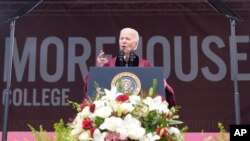
President Joe Biden on Sunday told the graduating class at Morehouse College that he heard their voices of protest over the Israel-Hamas war, and that scenes from the conflict in Gaza have been heartbreaking.
"I support peaceful nonviolent protest," he told students, some who wore keffiyeh scarves around their shoulders on top of their black graduation robes. "Your voices should be heard, and I promise you I hear them."
The president told the crowd that it was a "humanitarian crisis in Gaza, that's why I've called for an immediate cease-fire to stop the fighting" and bring home the hostages taken when Hamas attacked Israel on Oct. 7. The comments, toward the end of his address that also reflected on American democracy and his role in safeguarding it, were the most direct recognition to U.S. students about the campus protests that have swept across the country.
Morehouse's announcement that Biden would be the commencement speaker drew some backlash among the school's faculty and supporters who oppose Biden's handling of the war. Some Morehouse alumni circulated an online letter condemning school administrators for inviting Biden and soliciting signatures to pressure Morehouse President David Thomas to rescind it.
The letter claimed that Biden's approach to Israel amounted to support of genocide in Gaza and was out of step with the pacifism expressed by Martin Luther King Jr., Morehouse's most famous graduate.
The Hamas attack on southern Israel killed 1,200 people. Israel's offensive has killed more than 35,000 Palestinians in Gaza, according to local health officials.
Some members of the graduating class showed support for Palestinians in Gaza by tying keffiyeh scarves around their shoulders on top of their black graduation robes. One student draped himself in a Palestinian flag. On the stage behind the president, academics unfurled a Democratic Republic of Congo flag.
The country has been mired in an ongoing civil war that has plunged the nation into violence and displaced millions of people. Many racial justice advocates have called for greater attention to the conflict and for greater attention in the US to the conflict as well as American aid in ending the violence.
"Thank you God for this 'woke' class of 2024 that is in tune with the zeitgeist, the spirit of the times," the Rev. Claybon Lea Jr. said during a prayer at the start of the commencement.
The class valedictorian, DeAngelo Jeremiah Fletcher, said at the close of his speech that it was his duty to speak on the war in Gaza and that it was important to recognize that both Palestinians and Israelis have suffered.
"From the comfort of our homes, we watch an unprecedented number of civilians mourn the loss of men, women and children, while calling for the release of all hostages he said. "It is my stance as a Morehouse man, nay as a human being, to call for an immediate and permanent cease-fire in the Gaza Strip."
Biden stook and shook his hand after Fletcher finished.
The speech, and a separate one Biden is giving later Sunday in the Midwest, is part of a burst of outreach to Black constituents by the president, who has watched his support among these voters soften since their strong backing helped put him in the Oval Office in 2020.
After speaking at Morehouse in Atlanta, Biden will travel to Detroit to address an NAACP dinner.
Georgia and Michigan are among a handful of states that will help decide November's expected rematch between Biden and Republican former President Donald Trump. Biden narrowly won Georgia and Michigan in 2020 and needs to repeat — with a boost from strong Black voter turnout in both cities.
Biden spent the back end of the past week reaching out to Black constituents. He met with plaintiffs and relatives of those involved in Brown v. Board of Education, the landmark 1954 Supreme Court decision that outlawed racial segregation in public schools. He also met with members of the "Divine Nine" Black fraternities and sororities and spoke with members of the Little Rock Nine, who helped integrate a public school in Little Rock, Arkansas, in 1957.
In Detroit, Biden was set to visit a Black-owned small business before delivering the keynote address at the NAACP's Freedom Fund dinner, which traditionally draws thousands of attendees. The speech gives Biden a chance to reach thousands of people in Wayne County, an area that has historically voted overwhelmingly Democratic but has shown signs of resistance to his reelection bid.
Wayne County also holds one of the largest Arab American populations in the nation, predominantly in the city of Dearborn. Leaders there were at the forefront of an "uncommitted" effort that received over 100,000 votes in the state's Democratic primary and spread across the country.
A protest rally and march against Biden's visit are planned for Sunday afternoon in Dearborn. Another protest rally is expected later that evening outside Huntington Place, the dinner venue.
US remains top choice for Indian students going abroad
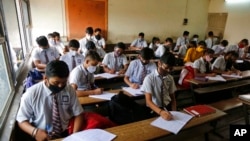
About 69% of Indian students traveling abroad for their studies chose the United States, according to a Oxford International’s Student Global Mobility Index. Other popular choices were the United Kingdom, Canada and Australia.
Education Times reports the main influencers for deciding where to study abroad – for Indian students and others – were parents. (April 2024)
Malaysian official: Schools can’t turn away from global tensions
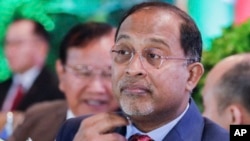
Zambry Abdul Kadir, Malaysia’s higher education minister, said protests spreading across universities in the United States show that schools can’t ignore political tensions.
Helen Packer, reporting in Times Higher Education, said the minister reminded educators that universities are key in the development of leaders, individuals and societies. (April 2024)
Social media breaks are difficult, but necessary

Between online classes, maintaining social connections and working on projects, college students can have a hard time disengaging from the demands of technology.
In Florida International University’s PantherNOW, Ariana Rodriguez offers strategies for taking a break from social media. (April 2024)





